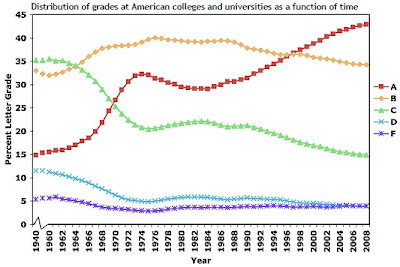I did walk to school well over a mile every day in Michigan when I was in the sixth grade and was on the school's safety patrol. It was cold and dark as I trudged across the frozen terrain in the winter. I manned a crosswalk on a busy thoroughfare. You would never see that today.
When my parents dropped my off for college everything I had was in one mid-sized trunk and a suitcase. My father helped me take my stuff up to my room, saw that I was the first to arrive and told me to grab the single bed and leave the bunk beds to my roomies. Almost 4 years in the Army during World War II will teach you to look out for yourself first. We dropped the bags, turned around and went downstairs to say goodbye to my mother. Five minutes after we arrived they were on their way home. By contrast, today's parents (me included) can't leave campus until every electronic device is hooked up, every book is purchased and every shirt folded away.
Neil Howe, the author of The Fourth Turning which I have written about before, captured the generational difference between the way Baby Boomers like me were raised and how Millennials like my children were raised in a recent commencement address at the University of Mary Washington. Thanks to John Mauldin for providing the address in his Outside the Box blog.
You Millennials grew up in an era of rising parental protection, never knowing a time without bicycle helmets, electric plug covers, Amber Alerts, and fifteen different ways to be buckled into your minivan seat. We, the parents, grew up in an era of declining parental protection: Our moms and dads told us, "We don't care where you go so long as you're home for dinner." As for seatbelts, we were told if there's an accident to just throw up our hands to protect our heads. As kids, we never saw a "Baby on Board" sticker. "Baby Overboard" would have been more appropriate.
You Millennials were raised to be special—very special—and to trust your counselors, support groups, and smart drugs to keep you feeling pretty good about the world, like a Sims character having just the right digital balance. We, the parents, knew we weren't very special, didn't trust anyone to advise us, and thought staying away from counselors was a sign of toughness. When you came to college, there were long orientations and immersions, and many of your parents clutched teddy bears and wept. When we came to college, we jumped out of the car and tried to grab our suitcases before our parents sped off.
I also went to college when an "A" meant something. It is far different today as Mark Perry points out in his Carpe Diem blog post "Today's Grade Inflated, Lake Wobegon World; Letter Grade of A Now Most Common College Grade". It is nice to get this data and show my kids that it really was tougher when I was in school. The only good thing about it is that my father did not have access to the same data to use it on me.
This chart shows that the average GPA in US colleges has increased from a 2.5 when I started college to a 3.0 today.
More telling is the distribution of grades. Since 1998, the letter grade "A" has become the most common grade that is given. Almost 45% of all grades given in college are an "A". Almost 35% of the grades are a "B". What is supposed to be the average "C" is now only given out 15% of the time.
I am not going to get too worked up about the grades. It is what the Millennials do when they get out of college is what really counts. And we need to count on this generation to fix all that is broken right now. Howe is optimistic that they may have what it takes.
So all of you parents out there: Be proud of this new generation. They aren't like you, but they are what America now needs. They don't complain about the storm clouds looming over their fiscal, economic, and geopolitical future; they try to stay positive. They don't want to bring the system down; they're doing what they can to make it work again. They worry about you a lot. And they want to come together and build something big and lasting, something that will win your praise. Beneath their tolerant, optimistic, networked, and risk-averse exterior lie attitudes and habits that may prove vital for our country's healing and for our country's future.
No one knows what challenges this Millennial Generation may eventually be asked to bear. Hardly anyone expects them to become America's next "Greatest Generation." But someday you can say you heard it from me: That is their destiny, to rescue this country from the mess to which we, the older generations, have contributed, perhaps a bit more than we ever intended—and, in so doing, to become a great generation indeed.A good way for Millennials to start is to educate themselves about the issues, get to the polls in November and vote intelligently. For the sake of their own future, this group cannot afford to be duped like they were in 2008 when they thought they were voting for hope and change. They need to put the effort in to see that the road we are on right now is leading them over a cliff.
If they will put in this effort, they will get an A from me.



No comments:
Post a Comment